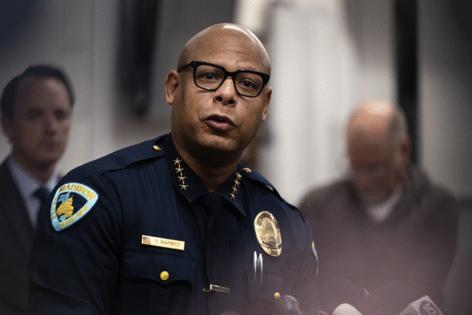Wisconsin police chief reported top choice for Seattle job
Published in News & Features
SEATTLE — Shon Barnes, the police chief of Madison, Wisconsin, thrown into the national spotlight by Monday’s school shooting there, is the top contender for the police chief job in Seattle, sources involved in the search have confirmed.
Barnes, 50, has been at the forefront of the response at the Abundant Life Christian School in Madison, where he has been chief since 2021, giving dimension to a career in which he has emphasized community and evidence-based policing. A teenager opened fire at the school Monday, killing two, wounding several others and then taking her own life.
Barnes’ name emerged last week as one of the top contenders to lead the Seattle Police Department. Mayor Bruce Harrell had tasked former SPD Chief Kathleen O’Toole and interim Chief Sue Rahr with finding a new leader following the demotion of former Chief Adrian Diaz, an SPD veteran whose four years as top cop became plagued by allegations of discrimination, retaliation, harassment and misconduct.
Diaz replaced former Chief Carmen Best, another career SPD veteran, who retired after coming under sharp criticism for her handling of the protests following the murder of George Floyd by a Minneapolis officer in 2020.
Harrell has made it clear that he wanted a chief from outside the department who could stabilize morale and lead the department out of the last vestiges of 12 years of federal oversight through a consent decree with the Department of Justice that has cost Seattle more than $200 million. Barnes has been a champion of community and evidence-based policing — practices at the heart of SPD’s overhaul.
Barnes has written that “Community Policing should be neighborhood oriented, community focused (business and residential), problem oriented, and based on the most current empirical research available to quickly reduce crime and improve citizens’ satisfaction with police services.”
Seattle’s process for selecting a police chief involves a committee that narrows the choices to three candidates and provides the names to the mayor, who makes a pick and then forwards that individual’s appointment — along with the names of the two other candidates — to the City Council, which must approve the selection.
In this case, it was a committee of two — O’Toole and Rahr — who vetted the candidates and made their recommendations to Harrell. Sources, speaking on condition of anonymity because they don’t have authority to discuss the process, said Barnes was favored by O’Toole, the last outside chief to lead SPD.
If selected, Barnes will take over a department nearly twice the size of Madison’s — roughly 1,000 sworn officers in Seattle compared to 500 in Madison — in a city with a much higher crime rate. Madison’s crime rate is about 34 per 1,000 residents. Seattle’s is about 114 crimes per 1,000 residents. Madison has a population of 280,000 people. Seattle has 755,000 residents.
Barnes has had a solid career in law enforcement, but not without controversy. He was sued in 2016 over allegations he made a false arrest; however, the claim was ultimately dismissed.
In 2022, he was investigated by the Madison City Civil Rights Department after he allegedly made comments about a departing female officer’s love life in an exit interview with the officer in 2021. The investigation concluded that Barnes did not violate city policy or create a hostile work environment with his comments, and he was exonerated of wrongdoing.
Barnes is married to Dr. Stephanie Dance-Barnes, and together they have three children: Ashlee, Aeiden and Addison, according to his biography.
He earned a bachelor of arts in history/pre-law from Elizabeth City State University in North Carolina, followed by a master’s degree in criminal justice from the University of Cincinnati. He furthered his education with a Ph.D. in leadership studies from North Carolina Agricultural and Technical State University.
Before becoming the chief of police in Madison, Barnes served in various roles, including director of training and professional development for the Civilian Office of Police Accountability in Chicago and deputy chief of police in Salisbury, North Carolina.
His career is marked by a strong commitment to community policing and evidence-based practices of the sort that have been encouraged by the court-appointed monitor of Seattle’s consent decree with the Department of Justice, as well as the city’s Office of Inspector General.
It is an approach to law enforcement that emphasizes research and empirical evidence to guide the department’s response to crime as well as address disparities in arrests, stops and use of force. Barnes was recently inducted into the “Evidence-based Policing Hall of Fame” at the Centers for Evidence-Based Crime Policy in the College of Humanities and Social Science at George Mason University.
He began his policing career in 2000 as a patrolman in Greensboro, North Carolina, where he served in a number of capacities, including detective. He rose to the rank of captain. He moved to Salisbury, North Carolina, where he was an assistant chief before he was hired in Madison as chief in 2021.
There is some irony in his candidacy, since the last outsider to apply and be considered for the Seattle job when O’Toole left in 2017 was former Madison police Chief Cameron McLay.
McLay was the leading choice to replace O’Toole and was top among the three finalists. However, his appointment was sidelined by then-Mayor Jenny Durkan, who acquiesced to community pressure and appointed Best, who had been O’Toole’s deputy. McLay was briefly brought in as an adviser to Durkan in the aftermath of Best’s appointment.
_____
©2024 The Seattle Times. Visit seattletimes.com. Distributed by Tribune Content Agency, LLC.







Comments